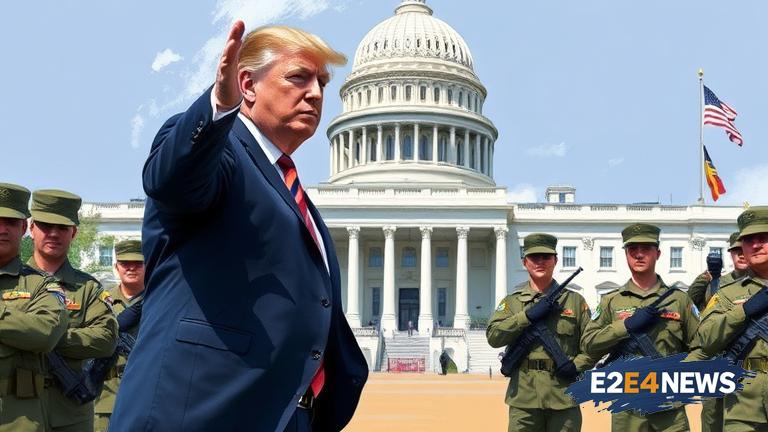The recent deployment of the National Guard to Washington has sparked a heated debate about the leadership style of US President Donald Trump. Trump has been accused of acting like a dictator by some Americans, who are concerned about the increasing militarization of the country. The President has defended his decision, stating that it is necessary to maintain order and protect the nation’s capital. However, critics argue that the move is an overreach of executive power and an attempt to suppress dissent. The deployment of the National Guard has also raised questions about the role of the military in domestic law enforcement. Some have expressed concerns that the move could lead to the erosion of civil liberties and the normalization of martial law. Trump’s leadership style has been a subject of controversy throughout his presidency, with some accusing him of being authoritarian and dismissive of democratic norms. The President has been known to use divisive rhetoric and has been criticized for his handling of protests and demonstrations. The deployment of the National Guard to Washington is seen by some as an escalation of this trend, and has sparked fears about the future of democracy in the United States. Despite the controversy, Trump remains popular among his base, who see him as a strong leader who is willing to take tough decisions. However, his critics argue that his leadership style is damaging to the country and its institutions. The debate about Trump’s leadership style is likely to continue, with some arguing that he is a necessary disruptor in a corrupt system, while others see him as a threat to democracy. The deployment of the National Guard to Washington has also raised questions about the relationship between the military and civilian authorities. Some have expressed concerns that the move could lead to a blurring of the lines between the two, and undermine the principles of civilian control. The issue has sparked a wider debate about the role of the military in American society, and the need for greater transparency and accountability. Trump’s decision to deploy the National Guard has also been seen as a reflection of his broader approach to governance, which emphasizes strength and order over nuance and diplomacy. The move has been criticized by some as a simplistic solution to complex problems, and has sparked concerns about the long-term consequences for the country. As the debate continues, it remains to be seen how the deployment of the National Guard will play out, and what the implications will be for the future of American democracy. The issue has sparked a lively discussion about the nature of leadership and the role of the military in society, and is likely to remain a major topic of discussion in the coming weeks and months. The controversy surrounding Trump’s leadership style is unlikely to subside, and the deployment of the National Guard to Washington has only added fuel to the fire. The President’s critics argue that his actions are a threat to the very foundations of American democracy, while his supporters see him as a champion of law and order. The debate is a reflection of the deep divisions in American society, and the need for a more nuanced and informed discussion about the role of the military and the nature of leadership. The deployment of the National Guard has also raised questions about the impact on local communities, and the potential for increased tensions between law enforcement and civilians. As the situation continues to unfold, it remains to be seen how the deployment will affect the daily lives of Americans, and what the long-term consequences will be for the country. The issue has sparked a wider discussion about the need for greater accountability and transparency in government, and the importance of protecting civil liberties. The controversy surrounding Trump’s leadership style is a complex and multifaceted issue, and one that is likely to continue to dominate the headlines in the coming weeks and months.
